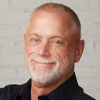
This issue was a joy to put together, and not least because in mid-July I was able to sit down and have a nice, long conversation with Peter Staley to talk about his new memoir, Never Silent: ACT UP and My Life in Activism. The book is a fascinating read, from his youth when growing up as a “precocious child” in Southern California to the troublemaker in the “ritzy” suburbs of Philadelphia, then coming out as gay and HIV-positive as the AIDS epidemic took hold, to his life in activism, and looking back on it all as he’s had time to reflect. I couldn’t help but draw parallels to my own life—Peter and I are about the same age, both gay, white, cis men diagnosed with HIV around the same time, but from there our lives took completely different paths. Well, maybe not completely, but I came around later to activism and was never part of ACT UP. After I tested positive, I continued working in the bars in Chicago as a deejay while going back to finish my degree, and started working at TPAN and eventually became editor of Positively Aware. Peter became a fierce advocate, along with many others, who fought and sometimes died to save our lives.
So, it was somewhat surreal and humbling to be sitting and having a casual chat with Peter about his book, and his life—our paths have crossed a handful of times over the years, but this was the longest conversation I’ve ever had with him, and it felt so comfortable, and fun (thanks, Peter!). The parts we couldn’t fit into this issue due to space constraints (what he really wanted to do at Jesse Helms’ house, the scruffy UPS guy who made a delivery in the middle of the interview, the humanity of Tony Fauci), you’ll just have to buy the book to find out about (well, all except the UPS guy). But it’s all there, he’s very candid in his memoir, which is what makes it so enjoyable to read.
So many voices, so many perspectives, but ultimately one goal. Improving our lives and the lives of people around us in whatever way we can.
Sometimes it’s good to step back, take stock, and reflect upon your life. In this issue we talk about some of the basics of HIV that we think will be helpful for people today—such as U=U and PrEP—which we didn’t have back in 1989 when I tested positive for HIV. Had I known then what I know now, I don’t think I would have felt nearly as much stigma or shame around sex and being HIV-positive. Michael Broder gives his personal perspective on sex and dating in the age of PrEP and U=U.
Also in this issue, Dr. David Hardy talks about some of the changes in treatment, and shifting public attitudes towards HIV and people living with HIV, compared to the early days. Associate Editor Enid Vázquez provides perspectives from both providers, and younger long-term survivors who acquired HIV around birth or at a young age, on children’s research and lessons learned. Scott Schoettes explains why decriminalization of sex work is good public health policy; and Bridgette Picou talks about what she has learned as a provider and a person living with HIV, and has an empowering message for others.
So many voices, so many perspectives, but ultimately one goal. Improving our lives and the lives of people around us in whatever way we can, by empowering ourselves with the tools and the knowledge to live better with HIV and other conditions.
I fully intended when I sat down to write this editor’s note that I would put everything in the context of COVID, but that didn’t happen. For now, the one thing I will say is, if you’re not vaccinated and eligible, please get vaccinated. If you have friends, family or people you know who are not vaccinated, try listening to them and attempt to gain an understanding of what it is that is holding them back. We may not be able to persuade everyone, but for each person we can get vaccinated, we are one step closer.
When we look back on COVID years from now, we will have an opportunity to reflect and pause, and celebrate our successes, while reconciling with our shortcomings and failures. Just as we had hope back in the early days of AIDS in the face of death and despair, we must strive to have hope now. It’s the only way through this.
Take care of yourself and each other.


